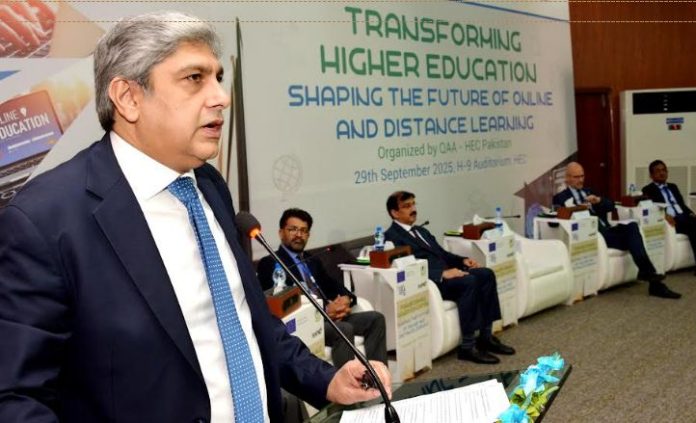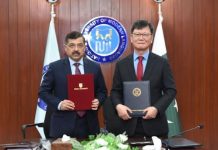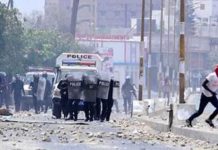ISLAMABAD, SEPT 30 /DNA/ – The Higher Education Commission (HEC) of Pakistan, under the auspices of its Quality Assurance Agency (QAA), hosted a Summit on Quality Assurance of Online and Distance Education in Pakistan at the HEC Secretariat, Islamabad. The event was organized in collaboration with Sukkur IBA University and international partners under the Erasmus+ Capacity Building in Higher Education (CBHE) Project “RAPID”.
The summit brought together distinguished national and international experts, policymakers, and academics to deliberate on enhancing the quality of online and distance education in Pakistan while aligning practices with international standards. Funded by the European Union Commission under Erasmus+ CBHE, the initiative represents a significant step in advancing institutional learning, global collaboration, and policy development for the higher education sector.
Addressing the inaugural session, Chairman HEC Mr. Nadeem Mahbub described the summit as a pivotal moment to rethink, reshape, and reimagine how education is delivered, assessed, and assured for quality in Pakistan. He emphasized that online and distance learning must serve as tools for equity, enabling access to higher education across Pakistan’s diverse geography, including underserved regions.
Stressing that technology is not a substitute for quality but a means to enhance it, he reaffirmed HEC’s commitment to strengthening digital infrastructure, conducting faculty capacity-building, enforcing policy frameworks, and integrating emerging technologies such as AI and virtual reality in ethical and effective ways. He urged that findings from the RAPID project be crystallized into next steps for policy refinement, calling upon stakeholders to see the summit as the beginning of sustained dialogue and collaboration.
In his welcome address, Executive Director HEC Dr. Zia Ul-Qayyum highlighted HEC’s resolve to strengthen quality assurance mechanisms in online and distance learning, noting that the RAPID project provides an opportunity to draw on European best practices while tailoring them to Pakistan’s needs. He stressed that building a resilient system of digital higher education requires collective ownership from universities, regulators, and international partners, and reaffirmed HEC’s commitment to steering this transformation in a structured and inclusive manner.
Mr. Philipp Gross, Chargé d’Affaires of the European Union Delegation to Pakistan, described the summit as a milestone that demonstrates how digital innovation, resilient policies, and international partnerships can strengthen Pakistan’s higher education system.
He stressed that RAPID is not only about digital tools but also about resilience, equity, and continuity in higher education.
Highlighting Pakistan’s global leadership in Erasmus+, where the country has ranked first worldwide for four consecutive years in Erasmus Mundus scholarships, he reaffirmed the EU’s commitment to supporting Pakistan’s digital transformation through faculty capacity building, infrastructure in remote universities, and long-term cooperation between European and Pakistani institutions.
Dr. Sher Muhammad Doudpota, RAPID Project Coordinator at Sukkur IBA University, emphasized that online education is the future of higher learning, accelerated by COVID-19 and the rise of generative AI. He underlined the need for Pakistan to adopt robust policies and quality assurance frameworks to remain relevant in the global education landscape.
Dr. Javed Ahmed Shahani, Co-Coordinator, highlighted the consortium’s achievements, noting that the project, comprising European and Pakistani universities with HEC’s Quality Assurance Agency as regulatory partner, has trained over 400 faculty members through webinars, seminars, and regional workshops, while 45 faculty benefited from mobility programs in Italy, Sweden, and Norway. He further shared that digital infrastructure is being established at the universities of Baltistan and Balochistan to bridge the urban–rural divide, and that a Policy Advisory Committee is working to refine Pakistan’s Open and Distance Learning framework.
The summit also featured technical sessions with leading international experts. Dr. Nicole Veelo of the Norwegian University of Science and Technology presented on “Technological Pedagogical Content Knowledge in Online Education.” Dr. Mexhid Ferati of Linnaeus University, Sweden, spoke on “Reflections on Hybrid Program Delivery.” Prof. Dr. Paolo Bottoni of Sapienza University of Rome, Italy, delivered a talk on “Managing Remote Learning: Risks and Opportunities.” This was followed by a presentation on ODL policy by Mr. Abaidullah Anwar.
The afternoon sessions highlighted Pakistan’s national context. Prof. Dr. Nasir Mehmood of Virtual University spoke on “Implementation Challenges of ODL,” while Dr. Tayyaba Tamim of LUMS and Dr. Zubair Khalid of IBA shared insights on “Gaps in the ODL Policy.” A panel on stakeholder engagement was moderated by Dr. Shakeel Ahmed Khoja of IBA Karachi, fostering discussion among senior academics and QA professionals on the way forward.
In his concluding remarks, Director General QAA Mr. Nasir Shah thanked participants and partners for their contributions, noting that while Pakistan has advanced in policy and capacity building, gaps remain in infrastructure, curriculum, and faculty training. He emphasized that the summit’s recommendations will be key to addressing these challenges and reaffirmed QAA’s role as a catalyst for translating them into actionable reforms that make online education a driver of inclusion and innovation.
The proceedings of the summit, including recommendations and outcomes, will be compiled and shared with stakeholders including the European Commission, partner universities, and HEC divisions. These findings will feed directly into the refinement of Pakistan’s national policy on online and distance education.

















